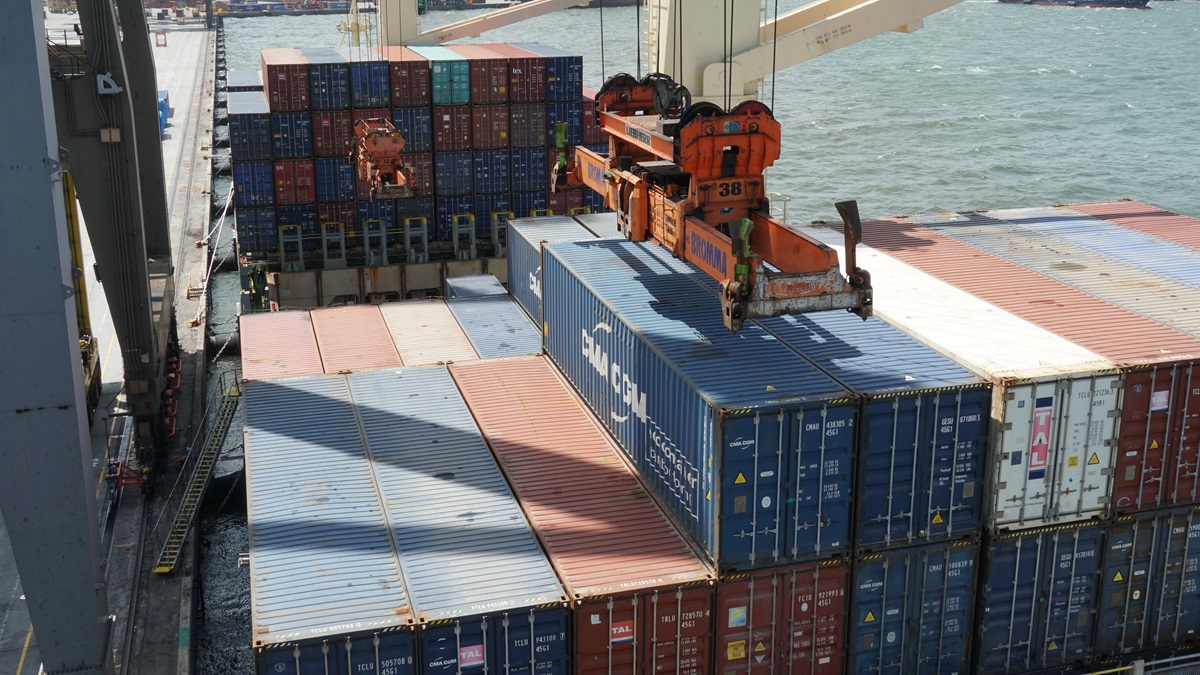The roadmap offers a blueprint for setting up a sustainable and efficient one-stop shop for trade procedures in line with national needs.

© Shutterstock/Luciavonu | A container is unloaded from a ship in the port of Kingston, Jamaica.
Jamaica's trade facilitation and paperless trade rating jumped from 50.5% in 2017 to 79.6% in 2023, after rolling out a national electronic single window with UNCTAD’s support.
The strategic move in 2020 revolutionized the Caribbean island nation’s trade processes by simplifying, standardizing, automating and coordinating the exchange of regulatory information and documents between traders and government agencies.
The electronic single window trimmed the approval time for import and export permits from three days to just 24 hours, significantly cutting the costs related to storage and demurrage – when goods are not removed from the port or terminal within the allotted free time.
It also improved the ease of doing business, helping to boost Jamaica’s imports by 29% and exports by 28% in 2022 compared to 2021.
“An electronic single window for trade is one of the most effective measures to enhance trade facilitation in a country,” says Shamika N. Sirimanne, UNCTAD’s technology and logistics director.
“Its potential impact is underscored by its inclusion as an obligation in the WTO Trade Facilitation Agreement.”
The system not only simplifies and speeds up trade but also ensures the transparent and uniform application of duties and taxes, generates additional government revenue, helps to combat corruption and ensures compliance with standards for public health and safety.
Single window roadmap to facilitate trade
With more than 40 years of experience pioneering digital solutions for customs clearance and trade facilitation, UNCTAD, through its Automated System for Customs Data (ASYCUDA), is at the forefront of so-called “tradetech” for the trade single windows.
The recent report “Roadmap for building a trade single window” distils UNCTAD’s experience and expertise into a blueprint for designing and implementing tailored electronic single window systems in line with national needs.
“Countries that already have a standards-based automated customs system in place, such as ASYCUDA, are on the right path,” Ms. Sirimanne says.
“Our roadmap helps countries reduce both the time and cost of establishing a single window system.”
Cutting time and trade costs in Vanuatu and Rwanda
Besides Jamaica, other success stories highlighted in the report show the diverse benefits that an electronic single window offers countries.
For example, the system has transformed how Vanuatu tracks imports and exports.
In 2021, the Pacific island nation recorded less than 5% of inbound and 0.1% of outbound goods shipped through the postal system. Today, 100% of these goods are tracked.
Thanks to the electronic single window developed with UNCTAD, government officials responsible for clearing internationally traded goods can now pre-assess import and export declarations, swiftly clearing goods the day they arrive. Before, the mostly manual clearance process took an average of 3 to 5 days during peak seasons.
Rwanda’s story is equally compelling. The UNCTAD system, operational since 2015, has saved the economy an estimated $15 million to $20 million. It has also allowed transporters to shave off $6 million annually thanks to faster clearance times.
Making trade greener in Timor-Leste
The environmental impact of these digital systems is equally noteworthy.
In Timor-Leste, the introduction of an electronic single window led to a staggering 90% decrease in physical trips between government agencies and an 80% cut in printed customs documents. This shows that the system not only streamlines processes but also helps curtail CO2 emissions.
As nations like Vanuatu, Rwanda, Jamaica and Timor-Leste have shown, the move towards digital trade facilitation systems based on UNCTAD ASYCUDA technology is more than a mere upgrade.
“Implementing a trade single window is a challenging task as it involves partnership between multiple government departments. This roadmap shows what to do, and what not to do, as countries attempt single window systems,” Ms. Sirimanne says.
The impact of electronic single windows on international trade will be a key topic at the Global Supply Chain Forum, set to be held in Barbados from 21 to 24 May 2024.


